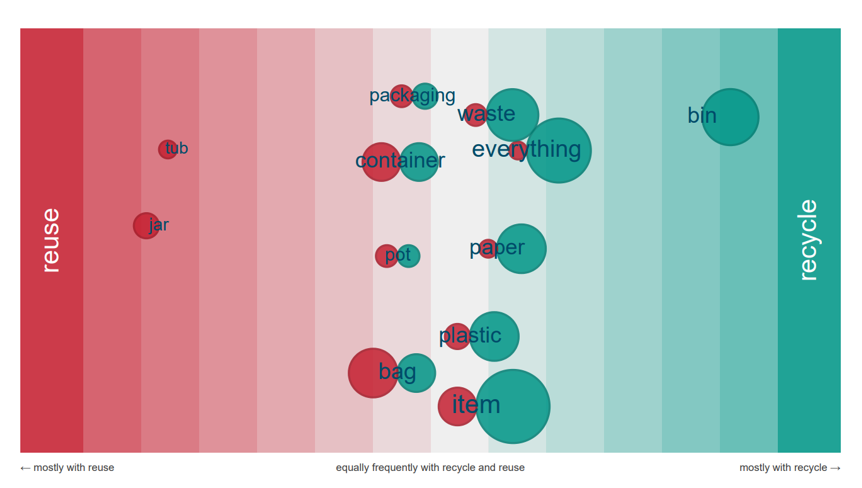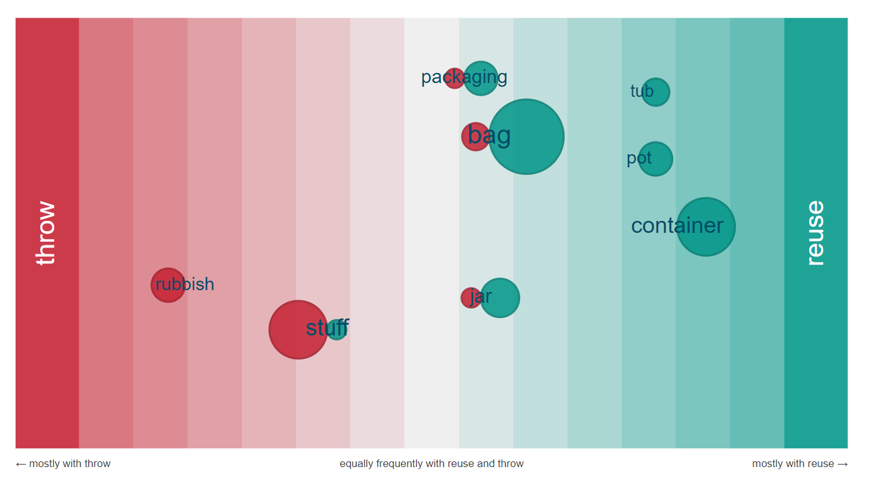Covid crisis to net zero: a story of dedication and doubt in recycling
by Sandra Young
In March 2022, the Concept Analytics Lab was awarded a grant from the Higher Education Innovation Fund (HEIF), run in partnership with the Sussex Sustainability Research Programme (SSRP). The call this year was aimed at addressing the critical challenges of Covid-19 recovery and climate change in an integrated way. We partnered with Africa New Energies (ANE), with their visualisation expertise. The Mass Observation project (MO) provided us with the data for an opportunity to apply our linguistic and computational analysis techniques to a new dataset.
Mass Observation directives focus on specific themes and ask volunteers called observers to write narrative responses to a series of questions on those themes. Every response is stamped with detailed information of each contributor-observer. In this case we studied the 2021 Household Recycling directive. This blog highlights key findings of our report and how our findings could feed into improving recycling performance in the UK.
What is waste?

Figure 1 shows us that many objects, depending on context, can either be reused or recycled: packaging, containers, waste (usually collocated as food, garden, household), pot, paper, plastic, bag.


In Figure 2 we see the perceived use of containers of different types in the way that they solely collocate with reuse and not throw (tubs and pots being types of containers). Jar is used in the context of both recycle and throw. When we look at the collocates this seems to be because of the contradiction between keeping, then throwing out if no use is found for said jars.
Here are some examples of the use of jars in context:
- I do keep some lidded jars for when I make jams and chutneys and sometimes I keep plastic containers to use for sowing seeds in or if they have lids for storage.
- Yes, I keep glass jars to reuse for leftovers, gardening, spices, herbs, food prep etc. I keep plastic containers from vegetables to use as dividers in the fridge. I reuse food bags and bread bags for leftovers and portioning items put into the freezer.
- I regularly hang out a bag of used jam jars for a friend who returns the favour by dropping off delicious home-made preserves, pickles and jams.
- I have a fondness for jars and biscuit tins, so some may linger in the garage until I find a use for them, or until I throw them out too.
Why is it waste?
Figures 1, 2 and 3 show us that packaging and plastic are important collocates for all three verbs (reuse, recycle and throw). When we look closer at the data we see this seems to be in relation to a number of issues: uncertainty, variation in services and multiplicity of packaging.
Here are some examples of the use of jars in context:
- Items not recycled tend to be plastic film of food packaging, hard plastic and black pastic [sic] which is marked as unrecyclable.
- We do not recycle black plastic, plastic bags, and polystyrene due to /a lack of facilities.
- Plastic is the most difficult to recycle. Why can’t it all be recycled? (Like most people, we have to throw away as much plastic as we recycle) My wife and daughter are fanatical about it.
- We can recycle most things but plastics are the most difficult items to get right.
- I try to recycle as much as possible but also aim to reduce my consumption of goods that are plastic wrapped or in plastic-coated packaging that can’t be recycled.
- I’m aware that black plastic food boxes or yoghurt pots can’t be recycled but uncertain about some clear plastic packaging for instance meat and fruit boxes.
- XXXX Council has an excellent Waste Wizard on their website describing exactly what to recycle and how to prepare it. XXXX Council’s webguide is less detailed, and in general they recycle a smaller range of plastics and don’t accept tetrapacks as XXXX does.
- In our area we are not able to recycle a huge amount of items – only plastic with numbers 1,2 and 3, for instance, so a lot of plastic packaging regrettably cannot be recycled
- We find it annoying and frustrating to find so much plastic that cannot be recycled – e.g. plastic bags and containers – crisp bags, coffee packs, inner packing of biscuit/confectionery etc.
Where does it go?
Coupled with uncertainty about plastics and other types of recycling, respondents expressed doubt as to what happens to recycling once it is taken away.
- I can’t say that I know what happens to the recycling once it is collected hence my very general answer but I do think I should find out.
- I honestly don’t know what happens to our recycling once it is collected.
- Do not really know what happens to the waste and whether it is put to good use.
- I don’t know what happens with garden waste in terms of collection.
This is coupled with a desire to know more about what happens:
- Its till a mystery, I don’t think local councils are transparent to what happens to our discarded rubbish and food waster.
- I do wish our council would come clean and do a huge item in the local paper (or on video) showing us what happens to all our stuff!
- Which types and numbers are acceptable is not given by the council, only vague guidance like plastic milk bottles are OK but not yoghurt pots – why?
- A lot is dependant upon Government funding but there is much more than the council can do in educating the public perhaps by starting with schools.
Our duty
Despite this doubt and cynicism in the process, respondents showed their clear commitment to recycling as a process, accompanied with a feeling of duty.
- I recycle because it is the right thing to do for environmental reasons.
- I recycle because I believe it is my duty as a citizen to do so, it is part of my very small contribution to addressing climate change along with a general desire to, where possible, reduce my carbon footprint.
- I recycle because I believe it is a responsible action to reduce waste to help the environment, wildlife and also less developed countries who are in immediate danger from the effects of climate change.
How can we improve?
The combination of lack of standardisation and information on the part of institutions such as the council, combined with this feeling of duty and responsibility as citizens on the part of the Mass Observation respondents, indicates that there might be a window of opportunity to intervene and improve recycling rates and quality through education and information sharing.
The findings in this report support research in other areas (Burgess et al (2021) and Zaharudin et al (2022) about the need for greater standardisation and reorganisation of recycling networks to maximise adherence to and performance of the recycling system. Our findings also suggest that another way to improve this would be the increase the information given to citizens about recycling processes, particularly in relation to what happens to recycling once it is collected.
References
Burgess, Martin, Helen Holmes, Maria Sharmina and Michael P. Shaver. (2021). The future of UK plastics recycling: One Bin to Rule Them All, Resources, Conservation and Recycling, January 2021, Vol. 164.
Zaharudin, Zati Aqmar, Andrew Brint, Andrea Genovese. (2022). Multi-period model for reorganising urban household waste recycling networks, Socio-economic planning sciences, July 2022.
About Us
We identify conceptual patterns and change in human thought through a combination of distant text reading and corpus linguistics techniques.


